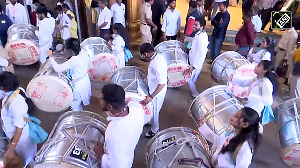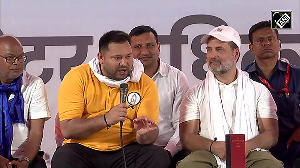A report released by a committee of Singur-based organisations investigating the Singur unrest in West Bengal over a land deal between the government and Tata Motors has revealed that the government's claim of most of the land being waste was utterly false.
The report said wasteland constituted a very small portion of the area to be acquired, less than 60 acres out of 997 acres allocated by the government.
The report further said, 'The people strongly believe that a car project or any industry cannot come up at the cost of destroying the agricultural land, common peoples' livelihoods and perceive the same to be an onslaught on the farmers, who are already indebted and committing suicide, not in Singur, but in other parts of the country.'
Industries Minister Nirupam Sen, while giving the committee a gist of the Project's salient features said, 'We know that the land is not a waste land as shown in the old records, most of it multiple crop land. We have a list of people to be trained for the factory, some of whom the Tata will absorb in the course but there can be no written guarantee.'
The report mentions that neither West Bengal Chief Minister Buddhadeb Bhattacharya or his ministers for industries, agriculture, land reforms turned up for the hearing on the issue, organized by Krishi Bhumi Raksha Committee and 'Samhati Udyog' -- an alliance of about ten organizations, including the Association for the Protection of Democratic Rights, NAPM, Khet Mazdoor Samiti, MKP, Nari Atyachar Virodhi Manch and others in Gopalnagar on October 27.
'If we do not agree to Tata's choice of land, they will go away to other state. We cannot afford it. We offered Kharagpur land but they rejected. They wanted land with ready infrastructure as they work out economics of a cheap car factory. They also needed it to be closer to Kolkata. There was no alternative.'
'The question is not of money -- it is of livelihoods, right to life and right to cultural diversity too. Instead of getting thrown into the slums on the periphery of urban areas, if farmers prefer to continue in agricultural activities, they cannot and should not be forcibly made to get off their present socio-cultural-economic natural environment,' the report stated.
The report appealed to the Left Front government 'to take a pro-people position, save farm land and farmers.'
'No project should be forced upon people. Industrialisation must only be complementary and supplementary to agriculture and not take a toll of the agro-economy, providing food security to all and livelihood support to more than 60 per cent of our population,' it concluded.





